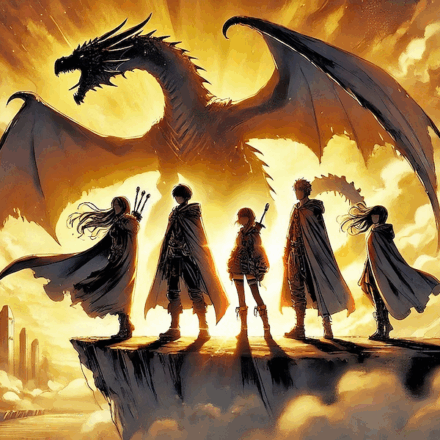Today’s guest article is by Gnome Stew reader Kyle, a long-time role-player who lives out his days in the mountains of Western North Carolina. He has played many different games and GMs more than he plays. Thanks, Kyle! –Martin
Not that kind of fresh blood. Not the kind that means you bring in new players to every campaign that you run. Rather the new blood that says “We are going to try something different.” While I am a huge fan of the baseline games that are out there (Dungeons and Dragons comes to mind), I think that every player should try something new. I have for many years been trying to convince my group to try new games. That has fallen flat on it’s face. They are tied to a couple of systems, which is okay in it’s own right. When I try to introduce them to a new game I get the standard answers of:
- I don’t have time to learn a new system.
- I read a review and am not sure that I like the game.
- I really don’t know about a game I have never heard of.
All of these excuses and more have been heard by many GMs. If you have a group that is only comfortable playing one game then you will quickly burn out. Not only as a GM but also as a player. I, of course, come from a different generation of role-playing. During my formative years you simply played whatever game showed up on Friday night. It was as simple as “Play this game or don’t play at all.” With the creation of the virtual tabletop community and more players coming out of the woodwork you can afford to be more picky about what you play.
That brings me to my main point. If your group becomes comfortable only playing one type of game (or one game in particular) then you will wind up bored. The best way, and to me the smartest way, to energize your group is to bring in a fresh game. Try to make it something that has not been tried before. Heck, you can even make it something that the group has done before, just not in a while. My main tips for bringing a new game to the table are:
Ensure that the game has a great group dynamic: I have read the other articles on this site about “group meta” and am in complete agreement. Each group does have it’s own lifeblood that makes that group tick. That makes conforming to your group dynamic more important when you are choosing new games to bring to the table. If your group loves crunchy games then it is probably best to avoid systems like FATE. If they love sci-fi games then it is a good bet that you can show them Traveller and get a good reception.
Group dynamic is, however, not only about what the group likes about games. It is also about how the game brings the players together. If a game lacks a good “team play” element then it is generally not a game for many groups (aside from games like Paranoia, which is all about being anti-normal RPGs). No players like to sit around a table while you spend whole sessions building up one PC in particular. I hate when a GM splits the party! It means that the group doesn’t get to play the game. You should always be aware of how the group functions in the game.
Make sure it fits your group’s play style: Make sure that the game also fits your play style. If you are into a lot of role-play then find games that allow that. If you are into “roll-playing” then you should go with games that let you drop the dice constantly. Play styles will differ from player to player, even in a long term group. Ask what the players like the most. Do they like puzzles or are they all into combat? Find a game that mixes these elements well, or at least to the best of their ability.
Test drive the game first, don’t jump right into a full scale game: I always advise “test-driving” a system before going into long-term campaigns. There is nothing like spending a good amount of time creating the perfect character for a game and then the game collapses due to the fact that no one likes the system. By playtesting games first you can see how the system feels and get a better grasp on if you want to spend your time playing it.
Find the right players, don’t just take the first group that comes along: Finding the right players can be tricky. If you have a group that you normally play with it gets a little easier. What if that group is large, though? How do you choose who to let into the new game? I advocate taking the players that seem the most interested, not just the ones who put their hand up first. This can also go if you have to step outside of your normal gaming buddies to find a group. How do you know that the first five players responding to your call are the best players for you? Take the time to find out. It will make the game more interesting and last longer.
All of that being said, I have no problem playing the classics. I still long for a good game of AD&D 2nd Edition. Fresh blood being brought to the table helps to keep you as a GM on your toes and active. I have seen too many people get bored because they are stuck in the same game time and again. Enough of my bloviating, though: What kind tips and tricks you bring to the table when it comes time to bring a new game to light?

















Rather than try out a new system “suddenly”, what I do with my group is run trial, one-shot games in other systems and/or settings on weekends when we can play but either I’m not comfortably prepared, don’t feel up to winging it, or a player of the core group is missing.
Our current Call of Cthulhu campaign has been broken up by: A one-room dungeon run with Barbarians of Lemuria, an Eclipse Phase one-shot focussing on the idea of changing morphs, and a pair of short Call of Cthulhu scenarios, one in the present day and one in Mideval France, contrasting nicely with our standard 1920s game.
Please explain concept: “one-room dungeon.”
Thanks!
Typo that I didn’t seem able to edit, sorry I just made this account after reading without commenting for a few months. I meant one-page dungeon, like the contest.
Here’s a one room dungeon: “The Orc and The Pie”
http://www.instantdungeon.com/node/4
Reminds me of this: http://www.goblinscomic.org/08212005/
Long time reader, first time commenter. You think you have it bad? It took four years for me to get my group to switch from 3.5 to Pathfinder. And now just as I’ve finally succeeded, 5e is on the horizon.
Of course I was running Kingmaker in order to get them to switch from 3.5, but I got exceptionally bored by the same old d20 rules we’ve been using forever and told my players we’d be doing a Dungeon World one-shot. At the end of the game my players were sold. So I would heartily recomend running a one-shot of something new in order to gauge interest and sell the system to your players.
Now more of my group is interested in indy RPGs which is great cause frankly I’m addicted.
Now if only I could get the player who hates Monte Cook (I don’t know why, I’ve met Cook, he’s pretty cool, and his designs are good) to try Numenera.
A lot of good points, you definitely offered some useful tips for dealing with squeamish gaming groups.
That said, the “I don’t have time” reason for not playing a new game is, in my experience, a legitimate one. Life happens. People get new jobs, move to new places, get married, explore other interests, etc. and I feel that you’re suggesting that it makes those people unwilling to broaden their horizons. Which is certainly not the case.
Another factor to consider is your reputation as a GM and your GM-ing style. Your style may lend itself well to some games and not others, and I’m willing to bet that your players know this. Your reputation may make players unwilling to play other games as well. For example sake, if you have a tendency to drop games “half-way-through” players will just avoid new games all together.
When it comes down to it, if you as a GM cannot find players in your current group that are interested, go find some others.
All in all, I feel that this topic is not as simple and clear cut as players just not being open to things.
I find it rather odd that any group refuses to try a new game once im a while. This is the first time I’m commenting so hi to everyone. How many players do you have ni your group?